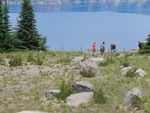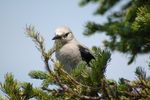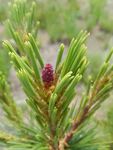NATURAL BENEFITS OF HIGH ELEVATION FORESTS - REPORT 2019
←
→
Page content transcription
If your browser does not render page correctly, please read the page content below
REPORT 2019 NATURAL BENEFITS OF HIGH ELEVATION FORESTS AMERICAN RELEAF PRIORITY LANDSCAPES - NORTHERN ROCKIES AND CASCADES
S U M M A R Y
The high-elevation forests of the The high-elevation, five-needle white
Northern Rockies and Cascades pines (known as Hi5s), including
provide many benefits: offering scenic whitebark pine, are also suffering
backdrops for backcountry skiers; major declines due to the spread of an
protecting snowpack as temperatures exotic disease, white pine blister rust.
rise; and controlling spring melts to Given these threats, whitebark pine is
provide a steady supply of water to a candidate species under the U.S
down-mountain users. Endangered Species Act and is already
listed as Endangered in Canada’s
Yet these critical natural services are Species at Risk Act.
threatened by climate change, as
longer periods of warmer, drier The latest research shows that
weather are fueling unprecedented whitebark pine ecosystems can adapt
native pest outbreaks and large, high- to climate change. However, the
intensity wildfires. In the Sierra ecosystem’s ability to adapt in the
Nevada, the amount of water provided future is dependent on the restoration
by melting snow to California’s actions we take now.
reservoirs is expected to decline by 50
percent over the next 20 to 40 years, American Forests is working with
so maintaining these valuable forests partners across the region to protect
as natural watershed protection will the many natural benefits of these
be critical in the future. special forests.
AMERICAN FORESTS REPORT 2019W A T E R
High-elevation forests are key to
maintaining forest cover at high
elevations.
- The whitebark pine is the
highest-elevation pine found in the
Northern Rocky Mountains. This
tree species thrives where no other
trees can. Whitebark pines are able
to withstand poor, rocky soils,
drought, subzero winters and near-
hurricane-force winds. They form
fire-resistant stands and are the
first tree to re-establish after
wildfires. Single trees can live for
millennia. Their hardiness and
tenacity will become more
Forests are important to providing drinking water and protecting snowpack.
important as the climate places
High-elevation forests protect further stressors on trees.
snowpack and water supplies from
warming temperatures. - The loss of whitebark pine will
cause an overall decrease in high-
- They shade and anchor snowbanks elevation forest cover. Whitebark
through spring months. This pine plays a “nursery” role in
protection is especially important on allowing other vegetation to
exposed, south-facing slopes. Without establish in the harsh alpine
healthy forests, downstream conditions. They provide protection
communities experience earlier from wind and sun and improve
runoff, greater flooding and dirtier water availability for other trees.
rivers. Two million people get their
drinking water from watersheds
within the range of whitebark pine.
- High-elevation forests in the Greater
Yellowstone Ecosystem form the
headwaters of three major river
systems in the West: the
Snake/Columbia, the Green/
Colorado and the Yellowstone/
Missouri/ Mississippi.
AMERICAN FORESTS REPORT 2019R E C R E A T I O N
High elevation forests are the
scenic backdrop for long trails,
ski area and national parks.
High-elevation forests improve scenery
for outdoor recreation and reduce
avalanche risk.
- Whitebark pines grow in idyllic, open
stands familiar to high-elevation hikers,
skiers and birders.
- Healthy, dense forests growing in
avalanche terrain reduce the likelihood of
avalanche release by preventing
continuous weak layers from forming.
- Studies conducted in the Colorado
Rockies reveal that a 75 percent reduction
in live trees following disease or beetle
outbreaks results in a similar reduction in
recreational use and enjoyment.
AMERICAN FORESTS REPORT 2019W I L D L I F E
High-elevation forests sustain -The Clark’s nutcracker and the
wildlife populations. whitebark pine have co-evolved
together for millennia. Nutcrackers
- Whitebark pine seeds provide as cache whitebark pine seeds in
many calories per ounce as butter. recently-burned areas and are the only
way that seeds are dispersed.
- They are a food source for over 110
wildlife species, including the
threatened grizzly bear. Grizzly bear
will feed almost exclusively on the
seeds when available before denning
in the fall. Whitebark Pine is an important food source
for wildlife like the Clark’s Nutcracker.
W E N E E D Y O U R H E L P
American Forests’ work to restore following page, driving restoration
whitebark pine and other Hi5 pines through a long-term collaboration
has become more urgent than ever. In based on science. Whitebark and other
the Crown of the Continent region Hi5 pines can be saved, but we need to
that includes Glacier National Park, act now to protect these wild, cone-
blister rust infection rates are up to bearing trees and produce rust-
95 percent. Additionally, the dramatic resistant seedlings before it is too
wildfires seen across the Northern late.
Rockies and Cascades in recent years
have added new urgency.
With your help, we will restore
thousands of acres by planting one
million rust-resistant whitebark pine
seedlings in just the next five years—
doubling our first 20 years of
progress. We will accomplish this
ambitious goal through the
Comprehensive Whitebark Pine
Recovery Strategy described on the
AMERICAN FORESTS REPORT 2019C O M P R E H E N S I V E W H I T E B A R K
P I N E R E C O V E R Y S T R A T E G Y
Whitebark pine snag 4. Plant and Restore Forests:
overlooking Wizard
Island at Crater Lake American Forests has been working
National Park, Oregon. across the Northern Rockies and
Cascades since 1999 to curb the heavy
losses of whitebark and other Hi5
pines, and to restore resilient forests
for the future. We have already
planted 500,000 whitebark pines over
1. Build Partnerships: In 2019, 2,000 acres in the United States and
American Forests is partnering with Canada, but this is just the beginning.
the U.S. Forest Service and other Our new Hi5 Restoration Fund will
organizations to create a new Hi5 help fund restoration projects aligned
Restoration Partnership that will guide with our Whitebark Pine Recovery
and integrate restoration efforts Plan. These projects include planting
among public and private partners— disease-resistant trees, hiring tree
essential across such a vast area. climbing crews to collect wild seed for
resistance testing and growing disease
2. Plan Guided by Science: American resistant-seedlings in special tree
Forests is collaborating with the U.S. nurseries. We will also help use the
Forest Service and Whitebark Pine fund to identify and protect the most
Ecosystem Foundation to develop the valuable cone-producing trees from
first range-wide National Whitebark threats like mountain pine beetle,
Pine Restoration Plan. This plan will severe wildfire and natural
prioritize the strategic locations for competition.
restoring whitebark pine and provide
guidance on innovative planting and 5. Communicate and Replicate: To
restoration techniques. help build this movement, American
Forests held the first-ever Whitebark
3. Advocate and Fund: American Pine Summit in November 2017,
Forests’ policy team is leading federal bringing together public agencies,
policy efforts in Washington, D.C., to nonprofits, tribes and potential
advocate for increased public funding funders to shape a shared restoration
and supportive agency policies that vision. American Forests is also a
can advance whitebark pine major sponsor of an international
restoration efforts. This includes conference on Hi5 restoration in 2020.
increased funding for reforestation on And we continue to build awareness
federal lands and enhanced agency and support through our award-
staffing for this work. winning magazine and online content.
AMERICAN FORESTS REPORT 2019You can also read


























































